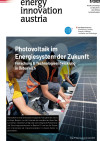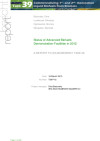Suchergebnisse für "Factsheet: Energietechnologien gestalten, die für alle sinnvoll und nutzbar sind"
Der IEA Bioenergie Jahresbericht 2011 ist online!
Der IEA Bioenergie Report 2011 ist ab sofort verfügbar. Der Bericht präsentiert ein Special zum Thema: "Aktueller Status der Produktion und der thermischen Verwertung von Biomasse Pellets". Darüber hinaus enthält der Bericht den Report des Executive Komitees sowie detaillierte Fortschrittsberichte der beteiligten Tasks.
Photovoltaik im Energiesystem der Zukunft

Forschung & Technologieentwicklung in Österreich
energy innovation austria
3/2021
Herausgeber: BMK und Klima- und Energiefonds
Deutsch, 12 Seiten
Downloads zur Publikation
IEA-SHC Task 47 Positionspaper
Das Position Paper zu IEA Solar Heating and Cooling-Task 47 "Nachhaltige Sanierung von Dienstleistungsgebäuden" ist veröffentlicht und steht zum Download zur Verfügung.
IEA Bioenergy Task 39, Newsletter, Ausgabe 63, Oktober 2023

Der Schwerpunkt dieser Ausgabe liegt auf dem Artikel zum Thema „Biofuels production and development in China“.
Tomas Ekbom, Hannah Edgren
Herausgeber: IEA Bioenergy Task 39, 2023
Englisch, 20 Seiten
Downloads zur Publikation
IEA SHC TASK 42 / ANNEX 29
Messverfahren zur Charakterisierung der Speicherfähigkeit von Phasenwechselmaterialien (PCM) - Aktuelle Aktivitäten des IEA SHC TASK 42 / ANNEX 29.
IEA PVPS Task 1: Snapshot of Global PV Markets 2018 Edition (1992-2017)

Der Snapshot Report 2017 gibt Einblicke über globale Photovoltaik-, Markt- und Technologieentwicklungen, sowie wichtige Änderungen in den nationalen politischen Rahmenbedingungen des vergangenen Jahres.
Herausgeber: IEA PVPS, Task 1, Edition 2018
Englisch, 16 Seiten
Downloads zur Publikation
IEA Bioenergy Task 32: Webinar "Residential Wood Combustion – Towards Low Emission Systems" (2021)

IEA Bioenergy Task 32 veranstaltete am 6. Mai 2021 ein internationales Webinar mit dem Titel "Residential Wood Combustion - Towards Low Emission Systems".
Herausgeber: IEA Bioenergy Task 32, 2021
Englisch
IEA - Netzwerktreffen
24. November 2009, 9:30 bis 17:00 Uhr
Gartenhotel Altmannsdorf, 1120 Wien
IEA PVPS Task 14: How an energy supply system with a high PV share handled a solar eclipse (2016)

Dieser Bericht beleuchtet den erfolgreichen deutschen Stromnetzbetrieb von der Vorbereitungsphase bis zum Echtzeitbetrieb im Zuge der totalen Sonnenfinsternis 2015.
Herausgeber: IEA-PVPS
Englisch, 18 Seiten
IEA Bioenergy Task 32: The future role of Thermal Biomass Power in renewable energy systems (2018)

Analyse der Rolle von Biomasse Kraftwerken in zukünftigen Energiesystemen am Beispiel Deutschland auf Basis von Simulationsmodellen.
Morten Tony Hansen et al.
Herausgeber: IEA Bioenergy Task 32
Englisch, 36 Seiten
Downloads zur Publikation
IEA ISGAN Annex 5 (SIRFN): Interconnection Standard Grid-Support Function Evaluations Using an Automated Hardware-in-the-Loop Testbed (2018)

Im Rahmen von IEA ISGAN-SIRFN wurden auf Basis der AIT Smart Grid Converter Plattform automatisierte Tests von netzstützenden Funktionen Smarter Wechselrichter durchgeführt.
Herausgeber: IEEE Journal of Photovoltaics, vol. 8, no. 2, pp. 565-571, doi: 10.1109/JPHOTOV.2018.2794884
Englisch
IEA Bioenergy Task 39, Newsletter, Ausgabe 62, Juli 2023

Der Schwerpunkt dieser Ausgabe liegt auf dem Artikel zum Thema „Biofuels production and developments in the European Union“.
Tomas Ekbom, Hannah Edgren
Herausgeber: IEA Bioenergy Task 39, 2022
Englisch, 27 Seiten
Downloads zur Publikation
IEA PVPS Task 15: BIPV research teams & BIPV R&D facilities - An international mapping (2018)

In diesem Bericht wurden internationale F&E-Testeinrichtungen aus dem Bereich BIPV umfassend dargestellt - der Fokus liegt auf Teilnehmerländer des IEA PVPS Task 15 Projektes.
G. Eder, L. Maul, P. Illich, W. Folkerts
Herausgeber: IEA PVPS Task 15
Englisch, 93 Seiten
Publikationen aus dem IEA Bioenergie Task 42
Im IEA Bioenergie Task 42 wurden ein Newsletter, der Bericht "Bioeconomy Survey 2014" sowie Biorefinery Fact Sheet publiziert.
Konferenz: 2. Puchberger Wirbelschichttreffen
19. Oct 2009 -
20. Oct 2009
Puchberg am Schneeberg , AT
Vom 19. - 20. Oktober 2009 findet in Puchberg am Schneeberg (NÖ) das 2. Puchberger Wirbelschichttreffenstatt. Das Treffen dient vor allem dem direkten Erfahrungsaustausch und der Weiterentwicklung der Wirbelschichttechnologie.
Status of Advanced Biofuels Demonstration Facilities in 2012

Der Bericht gibt einen Überblick über den Stand der Technik der Umwandlungstechnologien von Biomasse zu fortgeschrittenen Biotreibstoffen und stellt eine Ergänzung zu der vorhandenen Demonstrationsanlagen-Datenbank dar.
Herausgeber: IEA Bioenergy Task 39, BIOENERGY 2020+
Englisch, 209 Seiten
Downloads zur Publikation
Performance Evaluation of Lighting and Daylighting Retrofits: Results from IEA SHC Task 50

Erste Ergebnisse aus den Fallstudien zu Beleuchtungssanierungen in Nicht-Wohngebäuden im Rahmen des Subtask D "Case Studies" des IEA SHC Task 50 wurden auf der SHC 2015, der International Conference on Solar Heating and Cooling for Buildings and Industry, vorgestellt.
Marie-Claude Dubois, Niko Gentile, Claudia Naves, David Amorim, Werner Osterhaus, Sophie Stoffer, Roman Jakobiak, David Geisler-Moroder, Barbara Matusiak, Fredrik Martens Onarheim, Eino Tetri
Herausgeber: Elsevier, Energy Procedia, SHC 2015, International Conference on Solar Heating and Cooling for Buildings and Industry, Istanbul
Englisch, 10 Seiten
Downloads zur Publikation
IEA-DSM Spotlight-Newsletter #64, März 2017

Der Themenfokus des Newsletter liegt auf dem Nutzen von Verhaltensänderungen, der Wirtschaftlichkeit von Gebäudenachrüstungen sowie der Schweizer Energiestrategie 2050
Herausgeber: IEA DSM
Englisch, 7 Seiten
Downloads zur Publikation
IEA Forschungskooperation - Ausschreibung 2024
Finanziert werden österreichische Beteiligungen an den Tasks und Annexen der IEA Technologieprogramme. Angebote zu den thematischen Schwerpunkten können bis zum 17. Juli 2024 eingereicht werden.
IEA HPP Annex 32: Heating and Cooling for Low Energy Houses
20. November 2007, 14:00 - 16:30 Uhr
TU Graz - Hörsaal i6, Inffeldgasse 25/D, Graz
